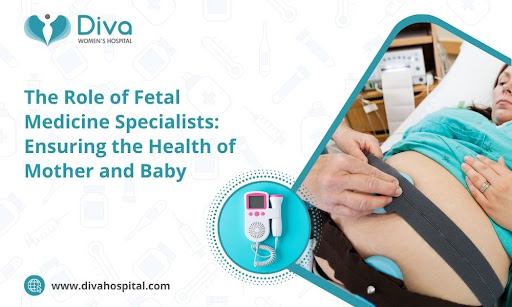
Pregnancy becomes a prime theme in a woman's personal life, featuring herself as well as the new heart developing inside her—they beat outside with rhythm. Pregnancy is beautiful; still, it brings a lot of uncertainties, expectations, and concerns. And then comes fetal medicine—one of the modern branches of medicine that not only deals with the diagnosis and treatment of the unborn baby (foetus) but also ensures that in this process both mother and child remain healthy.
The blog would show the significance of a fetal medicine specialist in a pregnancy cycle and why relying on one makes a difference—especially if the case was high-risk. Are you seeking expert fetal care? Walk into Diva Women's Hospital for compassionate, world-class fetal medicine services.
What is Fetal Medicine?
Fetal medicine is that area of obstetrics that deals with the care of the foetus before birth. This includes the monitoring of fetal growth, detection of any anomalies, management of high-risk pregnancies, and directed therapy before or just after delivery.
A fetal medicine specialist is a highly trained doctor-usually a gynecologist or obstetrician- who has had further specialisation in fetal health, ultrasound technology, and prenatal diagnosis.
Why is Fetal Medicine Important?
Mother's health largely affects the health of the baby. Proper diagnosis will result in the detection of any early complications and lead to the development of informed decisions, treatment, and interventions that can promote better outcomes for both the mother and the baby.
Some of the areas where fetal medicine plays a crucial role include:
Early detection of birth defects
Managing high-risk pregnancies
Monitoring twin or multiple pregnancies
Diagnosing chromosomal conditions (like Down syndrome)
Assessing fetal growth and development
Planning fetal surgeries or interventions
When Should You See a Fetal Medicine Specialist?
While all pregnant women undergo routine scans, not every case needs specialised care. However, you may be referred to a fetal medicine specialist if:
You are over 35 years of age
You have a family history of genetic disorders
You’ve had a previous miscarriage or stillbirth
Your ultrasound or blood tests show abnormalities
You’re expecting twins or more
You have conditions like diabetes or high blood pressure
Key Roles of a Fetal Medicine Specialist
1. Detailed Prenatal Screening & Diagnosis
Fetal medicine specialists conduct detailed ultrasounds and screenings such as:
NT Scan (11–14 weeks): Checks for chromosomal abnormalities
Anomaly Scan (20 weeks): Detects structural defects
Doppler Ultrasound: Monitors blood flow to the baby and placenta
Genetic Testing & Amniocentesis: Helps identify genetic disorders
These tests help in planning the right steps, whether it’s further testing, fetal therapy, or early delivery planning.
2. Management of High-Risk Pregnancies
If a pregnant woman suffers from an illness or any condition that is dangerous for the foetus, a fetal medicine specialist will coordinate the management plan with other specialists, such as an endocrinologist, neonatologist, or surgeon.
Examples include:
Managing intrauterine growth restriction (IUGR)
Preterm labor monitoring
Managing Rh incompatibility
Placenta complications like previa or accreta
3. Monitoring Multiple Pregnancies
Monitoring Twins or Triplets may be required on a more frequent basis. The specialist is also assessing for potential complications like twin-to-twin transfusion syndrome (TTTS), a condition where blood flows inconsistently between twins sharing a placenta, or growth restriction in one of the babies.
Such early detection of possible complications through regular ultrasounds and monitoring allows the opportunity for early management so that the babies grow up healthy.
4. Planning Fetal Interventions or Surgery
Under certain circumstances, surgery can be done when the fetus is still in the womb or immediately after birth. Such rare interventions will involve great precision and planning:
Treating fluid build-up (hydrops fetalis)
Laser surgery for TTTS
Blood transfusions to the fetus
Shunt placement for bladder obstructions
Fetal medicine specialists guide such treatments, often coordinating with pediatric surgeons and NICU teams.
5. Emotional Support & Counseling
The fetal abnormality diagnosis may be emotionally overwhelming. A fetal medicine specialist would not just explain the medical condition but also lend emotional support and dive into what therapy options or results would help the father and mother come to an informed and empowered decision-making process.
Fetal Medicine at Diva Women’s Hospital
Diva Women's Hospital believes every baby deserves the best possible start in life. State-of-the-art equipment, understanding and combining with the expertise of our fetal medicine specialists to offer you a personalized experience.
What Makes Diva Stand Out?
Advanced 3D/4D fetal ultrasound machines
In-house genetic counseling
High-risk pregnancy clinic
Experienced team of obstetricians, fetal specialists, and neonatologists
Peaceful, private setting for expecting mothers
Complete pre-birth and post-birth planning
Whether you need a routine scan or help managing a complicated pregnancy, our fetal medicine team is here for you every step of the way.
Benefits of Fetal Medicine Services at Diva
Early detection of complications
Better planning of delivery
Specialized care in high-risk cases
Reduced risks of emergency situations
Emotional and medical support for parents
Improved outcomes for both mother and baby
A fetal medicine specialist cares for two essential and highly precious lives: for the fetus and for the mother. Pregnancy is not only about the baby; it is the betterment, the happiness, and safety of the mother as well.
Diva Women's Hospital is fully equipped to carry out this commitment within a facility that has fetal specialists. This facility provides the needed professionalism and expertise that an expectant woman can associate with her step into parenthood.
Whether you are pregnant, going to be pregnant, or planning to get pregnant, you can count on experts at Diva right from the beginning.
Blog Source -- The Role of Fetal Medicine Specialists
Comments
Post a Comment